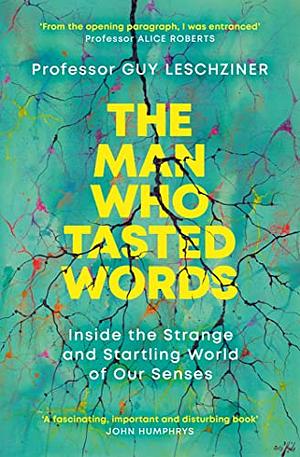
The Man Who Tasted Words
by Guy Leschziner
Genres: Non-fiction, SciencePages: 326
Rating:

Synopsis:Vision, hearing, taste, smell, and touch are what we rely on to perceive the reality of our world. Our senses are the conduits that bring us the scent of a freshly brewed cup of coffee or the notes of a favorite song suddenly playing on the radio. But are they really that reliable? The Man Who Tasted Words shows that what we perceive to be absolute truths of the world around us is actually a complex internal reconstruction by our minds and nervous systems. The translation into experiences with conscious meaning—the pattern of light and dark on the retina that is transformed into the face of a loved one, for instance—is a process that is invisible, undetected by ourselves and, in most cases, completely out of our control.
In The Man Who Tasted Words, neurologist Guy Leschziner explores how our nervous systems define our worlds and how we can, in fact, be victims of falsehoods perpetrated by our own brains. In his moving and lyrical chronicles of lives turned upside down by a disruption in one or more of their five senses, he introduces readers to extraordinary individuals, like one man who actually “tasted” words, and shows us how sensory disruptions like that have played havoc, not only with their view of the world, but with their relationships as well. The cases Leschziner shares are extreme, but they are also human, and teach us how our lives and what we perceive as reality are both ultimately defined by the complexities of our nervous systems.
The Man Who Tasted Words sounds like it’s going to be about a lexical->gustatory synaesthete, and the blurb also calls out that part, so I just want to say up front that it’s not really like that. There’s one chapter that discusses synaesthesia, and it doesn’t give it an especially long consideration or something.
In the end, it’s a book in the vein of many other similar books: the author’s a neurologist, and he draws stories from his practice to illustrate how the brain works, and how it fails to work. It’s always fascinating to read that kind of thing, but at the same time, this isn’t new at all. It has all the predictable beats (here’s the patient he failed, here’s the worst thing he’s ever experienced as a doctor, here’s the fascinating case), and the stories don’t particularly illustrate anything surprising and new.
So if you don’t read a lot of these, or conversely if you absolutely love them and read every single one you can get your hands on, this might be worth some time. I thought it was just OK, though.
Rating: 3/5

I would read a book entirely about synesthesia or synesthetes, but not yet another basic neurologist book, so the warning is much appreciated!
Yeah, I was really disappointed by that. It’s not that I find neurology uninteresting, but most of the “weird” cases are predictable once you know a little…
It’s the same dozen conditions with different patients in every book, as though everyone needs to be Oliver Sacks II. Whereas, there are many kinds of synesthesia, some of them are even common but we don’t think of them as synesthesia, one could absolutely write an entire book just on it.